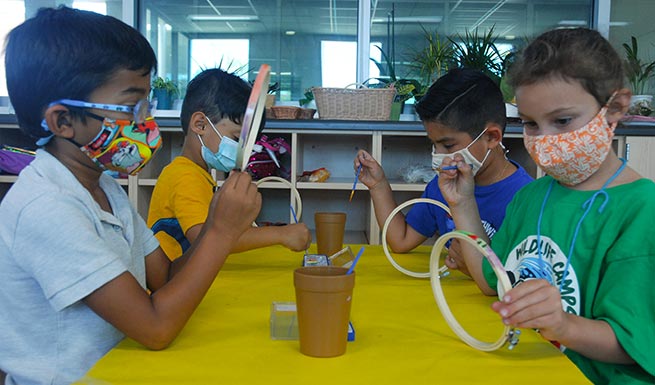All children should have equal access to the tools and resources for social-emotional learning. For students to excel academically, foster healthy relationships with others, and become caring, empathetic global citizens, social-emotional learning is an important part of their education. It is also a powerful tool and catalyst for achieving equity across student populations.
Defining Social-Emotional Learning
The Collaborative for Academic, Social and Emotional Learning (CASEL) defines social-emotional learning as “the process through which all young people acquire and apply the knowledge, skills and attitudes to develop healthy identities, manage emotions, and achieve personal and collective goals.” Social-emotional learning also helps children “feel and show empathy for others, establish and maintain supportive relationships, and make responsible and caring decisions.”
Social-emotional learning is best achieved through trusting partnerships between schools, families and the communities they share. This collaboration nurtures knowledge, skills and attitudes across five important areas of social and emotional competence.
Core Attributes of Social-Emotional Learning
The five core attributes of social-emotional learning are described in detail in the CASEL Framework. For a comprehensive social-emotional learning program better positioned for success, these five attributes should be part of the educational curriculum during key child development stages and through adulthood:
- Self-awareness: how behavior is influenced by the way we understand emotions, thoughts and values, including recognizing strengths and limitations.
- Self-management: how we achieve goals and desires by managing our thoughts, emotions and behaviors, including stress management and delayed gratification.
- Social awareness: how we use empathy to understand and appreciate the perspectives of those with diverse backgrounds, cultures and traditions, including feeling compassion and understanding of how historic norms can affect others’ behavior.
- Relationship skills: how we develop healthy, supportive relationships with others by listening, communicating clearly and cooperating, especially with diverse individuals and groups.
- Responsible decision-making: how we make caring and constructive personal behavior choices and social interactions, including evaluating the consequences of decision-making.
The Importance of Social-Emotional Learning
Elementary classrooms are a rich mix of diversity. Students, their families and communities are all part of the educational mechanism that shapes learning, empathy and understanding. That’s why social-emotional learning is so important.
Equitable learning environments are fostered by implementing well-designed, evidence-based classroom practices and programs. This becomes the foundation of successful and effective social-emotional learning. The integration of social-emotional learning throughout a school’s curriculum and culture, and further into family education and community organizations, is the best way to get everyone involved and support children in their learning.
According to CASEL, this united approach “establishes supportive classroom and school climates and approaches to discipline.” It also strengthens authentic family and community partnerships.
Social-Emotional Learning is Making a Difference
The impact of social-emotional learning can be seen from the classroom to the community. Here is how social-emotional learning is making a difference today, according to CASEL:
In the Classroom – When teachers incorporate students’ personal experiences, cultural backgrounds and input, it establishes an inclusive classroom environment. Students become partners in the educational process and build self-worth and confidence. This student-teacher partnership facilitates co-learning, fosters student and adult growth, and generates collaborative solutions.
In the School – A strong school culture is rooted in students’ sense of belonging and engagement. By coordinating and building upon social-emotional learning practices and programs, schools create an environment that infuses it into every part of the educational experience and promotes positive social, emotional and academic outcomes.
In Families and Caregivers -Schools need inclusive decision-making processes that ensure that families — particularly those from under-resourced groups — are part of planning, implementing and continuous improvement of social-emotional learning. This partnership helps families understand and support the social and emotional development of their students.
In the Community – Community programs provide a safe, encouraging and supportive environment for young people to practice their social and emotional skills. These settings are important for personal growth and could open doors to future opportunities.
While social-emotional learning alone will not solve longstanding systemic inequities in the education system, it does provide the framework and create the environment necessary to “shake up” inequitable policies and practices to nurture more inclusive learning opportunities and support the interests of each student.














